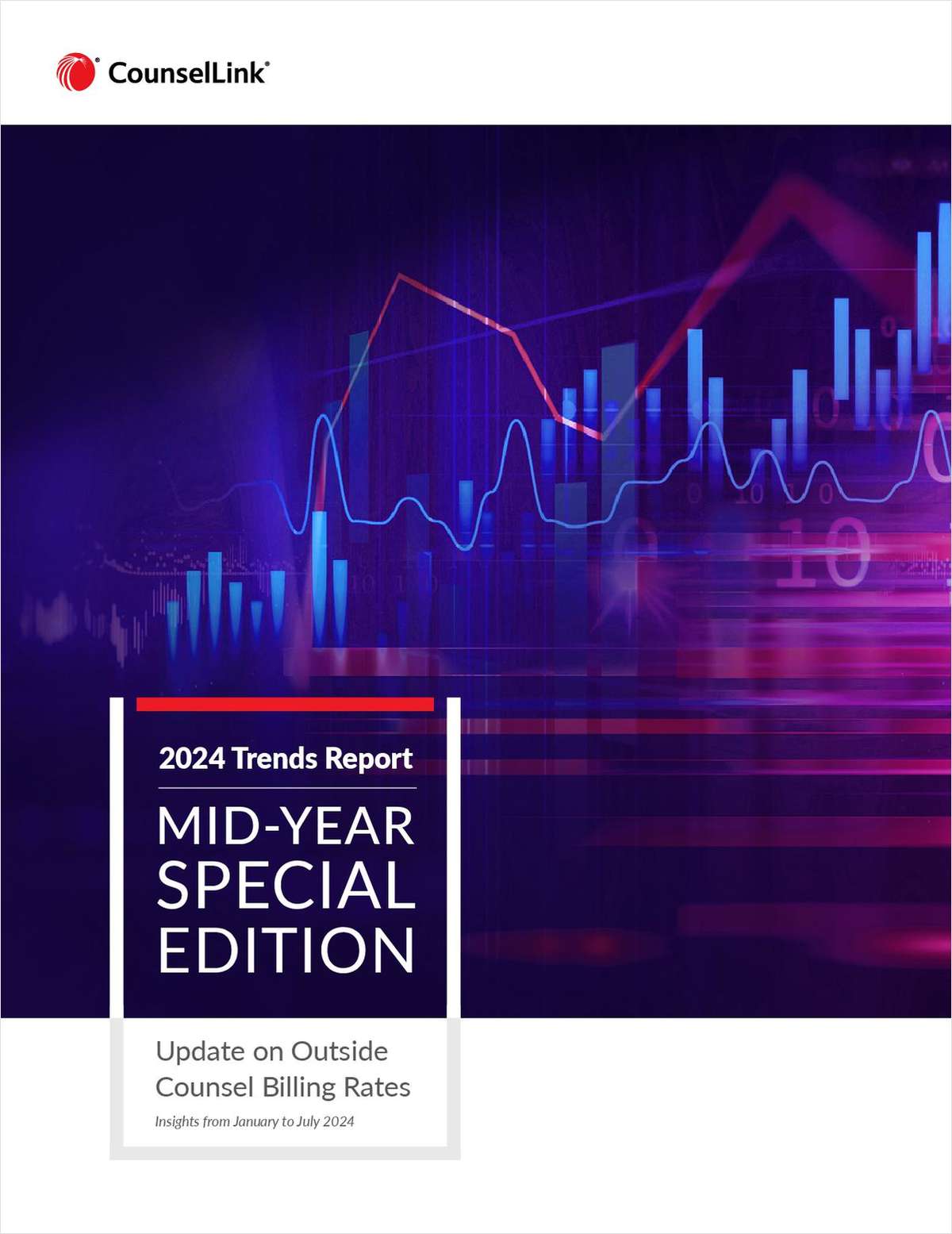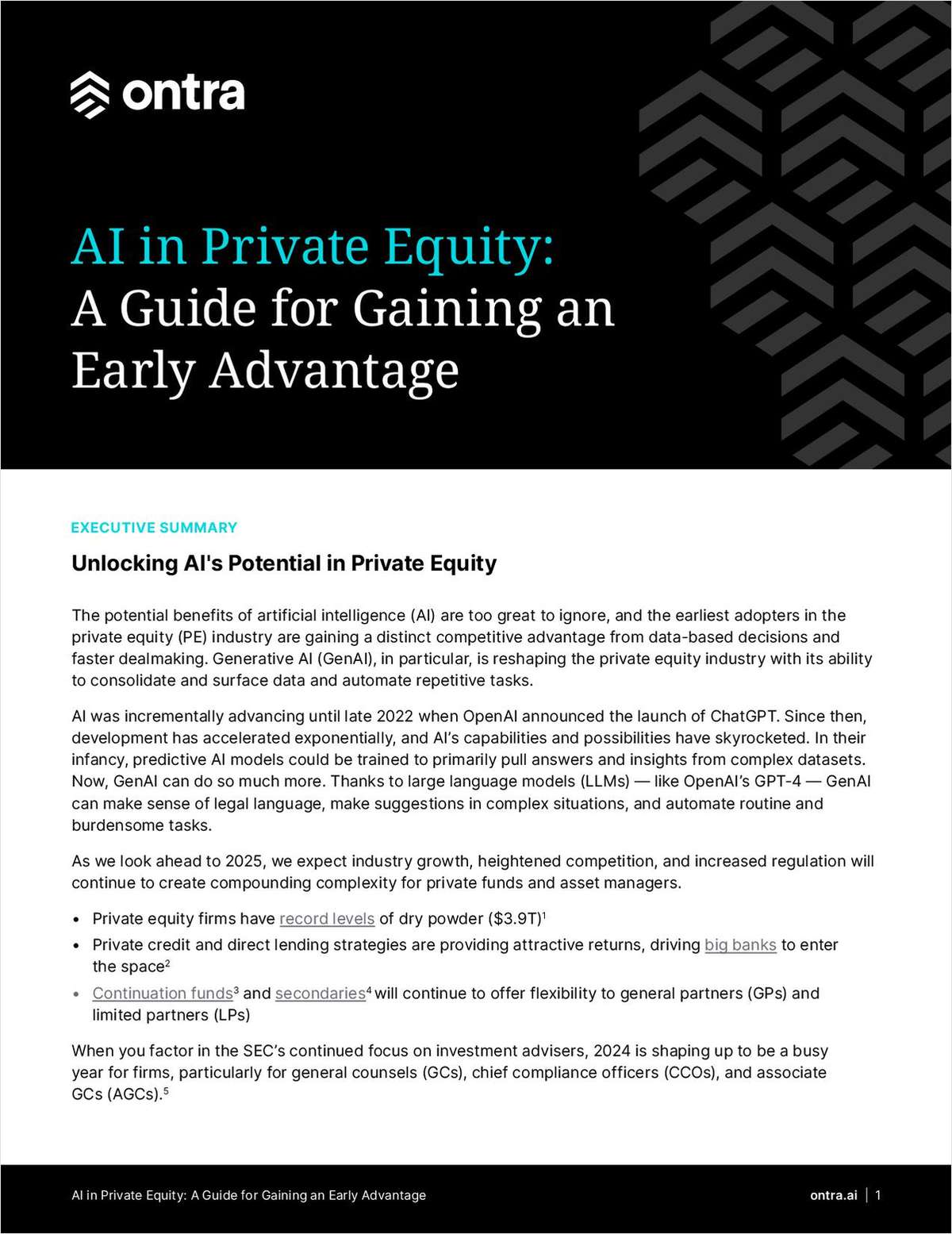The General Counsel’s Reporting Relationship Counts, Too
In her recent article, “Why Would Company Execs Want Their GC to Report to the CFO?”, Julie Brush sheds daylight on a governance issue that…
October 03, 2017 at 01:49 PM
6 minute read
The original version of this story was published on Law.com
In her recent article, “Why Would Company Execs Want Their GC to Report to the CFO?”, Julie Brush sheds daylight on a governance issue that has, unfortunately, long remained in the shadows.
And that's the matter of the general counsel's internal reporting relationship. It's a vitally important corporate responsibility concern, and is critical to the integrity of the organization's commitment to legal compliance. And it is the ultimate responsibility of the governing board to assure that the relationship is properly structured and maintained.
For the past 15 years or so, much of dialogue on executive suite reporting relationships has been focused on the compliance officer, for good and proper reasons. But that focus has had the unintended consequence of diverting attention from the equally important means by which the general counsel reports upstream to management and to the board.
For it is entirely fair to say that the primary concern with compliance officer reporting—eliminating management level barriers to the delivery of her advice–applies equally to the general counsel. The ultimate goal is to remove inappropriate barriers to the delivery of compliance and legal advice, so leadership may be fully informed and capable of responding as circumstances may require.
And on that point, Ms. Brush's observations on the problems with “GC to CFO reporting” are spot-on. But in addition to her helpful anecdotes, there's also a fair amount of policy substance on the broader issue of general counsel reporting relationships.
Take the Sarbanes Oxley Act for example–which celebrated its fifteenth anniversary this year. A main premise of the Act was the need for greater transparency of risk, and an increased flow of information and operational disclosure from all executive levels to the board. A common characteristic of many of the scandals that led to the Act was a marginalization of the office of general counsel, and the inability of the board to have access to the general counsel's unvarnished advice. Indeed, a key legacy of the Act is the important role that the general counsel plays with respect to corporate governance.
And then there's the significant monographs prepared by the American Bar Association (“ABA Report”) and the Bar Association of New York City (“NYCBA Report”), in the aftermath of Sarbanes.
The NYCBA Report gets right to the point: “The General Counsel's reporting relationships and access to management and the board need to be consistent with senior status in the corporation. We believe that the General Counsel should report to one of the highest ranking company executives, most often either the CEO or the officer carrying out the day-to-day duties of the CEO”. By footnote, the NYCBA Report observes that in some organizations, it may be more effective for the general counsel to report to the chief operating officer as opposed to the CEO. It cautions, however, that any such reporting relationship should be premised on the assumption that the general counsel maintains “ready, unrestricted access to the CEO”, and that the office of the general counsel is maintained at an appropriately senior level within the corporate hierarchy.
Ms. Brush would be pleased to know that the NYCBA Report explicitly rejects a general counsel-to-CFO reporting relationship. “…[T]he general counsel should not report to the CFO due to their respective roles in financial reporting and disclosure”. The Report also shares the perspective of the estimable Ben Heineman, Jr. that the general counsel and CFO positions should be on the same reporting level within the corporation.
Both the NYCBA and the ABA Reports make it clear that the board has a very clear stake in the general counsel's reporting relationships. For example, they both recommend that the hiring, firing and compensation of the general counsel should be subject to board approval. They also note that an effective reporting relationship should be grounded in a clear commitment of the board and executive management to promote a culture of integrity and compliance with the law. This would include, among other elements, a strong relationship between the general counsel and the CEO, as well as ready access of the general counsel to other senior executive officers, and to chairs of key board committees.
In addition, the ABA Report's recommendations on the reporting obligations of lawyers led directly to the important amendments to Sections 1.13(b) (Organization as a Client) and 1.6 (Confidentiality of Information) under the Model Rules of Professional Conduct. These Rules, as amended, instill certain reporting and confidentiality obligations on counsel once they become aware that a corporate agent is engaged in action, intends to act or refuses to act in a manner that is a violation of a legal obligation to the corporation, or a violation of law that reasonably might be imputed to the organization, and that is likely to result in substantial injury to the corporation.
Both corporate leadership, and the interests of legal compliance, would benefit from a greater organizational awareness of these “reporting up” obligations. They serve as a powerful and motivational supplement to otherwise established general counsel reporting relationships.
Drawing this long-overdue attention on the general counsel's reporting relationships is in no way intended to dilute the importance attributed to the proper reporting relationship of the chief compliance officer. They're both important; equally so. To suggest otherwise is to mischaracterize the proper (and expanding) role of the general counsel. It also serves to marginalize her well established ethical duties and professional responsibilities.
So Ms. Brush's article, together with the Sarbanes anniversary, provide a legitimate and welcomed “prompt” to raise general counsel reporting issues with senior management and the board's audit committee—without picking specifically on the CFO!
Michael W. Peregrine, a partner at McDermott Will & Emery LLP, advises corporations, officers and directors on matters relating to corporate governance, fiduciary duties, and officer-director liability. His views do not necessarily represent the views of McDermott Will & Emery or its clients.
This content has been archived. It is available through our partners, LexisNexis® and Bloomberg Law.
To view this content, please continue to their sites.
Not a Lexis Subscriber?
Subscribe Now
Not a Bloomberg Law Subscriber?
Subscribe Now
NOT FOR REPRINT
© 2024 ALM Global, LLC, All Rights Reserved. Request academic re-use from www.copyright.com. All other uses, submit a request to [email protected]. For more information visit Asset & Logo Licensing.
You Might Like
View All
'The Unheard of Superpower': How Women's Soft Skills Can Drive Success in Negotiations

Georgia July Bar Exam Results: Highest Overall Passing Rate in 10 Years

Elder Litigators Confront Tough Questions in Last Act of Careers

The 'Biden Effect' on Senior Attorneys: Should I Stay or Should I Go?
9 minute readTrending Stories
Who Got The Work
Nicholas M. DePalma and Christian R. Schreiber of Venable have stepped in to represent CP Management Services, CRS RB4 Holdings and other defendants in a pending breach-of-contract lawsuit. The suit was filed Aug. 30 in Virginia Eastern District Court by Greenberg Traurig on behalf of Daito Kentaku USA. The case, assigned to U.S. District Judge Claude M. Hilton, is 1:24-cv-01538, Daito Kentaku USA, LLC v. Comstock Partners, LC.
Who Got The Work
Wyatt, Tarrant & Combs partner Andrew J. Pulliam has entered an appearance for Steve Jensen in a pending breach-of-contract lawsuit. The action, filed Aug. 30 in Tennessee Middle District Court by the Law Office of Perry A. Craft on behalf of Timothy Robins, accuses the defendant of writing a worthless check for over $94,000 for the sale of auctioned goods. The case, assigned to U.S. District Judge Eli J. Richardson, is 3:24-cv-01064, Robins v. Jensen et al.
Who Got The Work
Lane Powell shareholder Pilar C. French has entered an appearance for Penney OpCo LLC in a pending consumer class action. The complaint, filed Aug. 26 in Oregon District Court by Hattis & Lukacs, alleges that the company markets fictional discounts for certain products. The case, assigned to U.S. Magistrate Judge Mustafa T. Kasubhai, is 6:24-cv-01414, Gamble v. Penney OpCo LLC.
Who Got The Work
Donald L. Carmelite and Coryn D. Hubbert of Marshall Dennehey have stepped in to defend the City of York, Detective Roland Comacho and Detective Lisa Daniels in a pending civil rights lawsuit. The complaint, filed Aug. 27 in Pennsylvania Middle District Court by Levin & Zeiger on behalf of Noel Matos Montalvo, seeks damages for the amount of time that Montalvo was incarcerated over five years for the exonerated killing of his common law wife. The case, assigned to U.S. District Judge Jennifer P. Wilson, is 1:24-cv-01459, Montalvo v. City of York, et al.
Who Got The Work
Joseph M. Englert, Brian E. Pumphrey and M. Laughlin Allen of McGuireWoods have entered appearances for Bank of America NA in a pending class action. The action was filed Aug. 26 in Georgia Northern District Court by Podhurst Orseck; Webb, Klase & Lemond; Crabtree & Auslander; and Morrison + Associates on behalf of the representative of the beneficiaries of the Arthur N. Weinraub Trust, a trust which contains residential real property. The suit accuses the defendant of overcharging the trust by selecting unnecessary and/or excessively priced insurance for the property. The case, assigned to U.S. District Judge Thomas W. Thrash Jr., is 1:24-cv-03780, Weinraub v. Bank of America, N.A.
Featured Firms
Law Offices of Gary Martin Hays & Associates, P.C.
(470) 294-1674
Law Offices of Mark E. Salomone
(857) 444-6468
Smith & Hassler
(713) 739-1250








